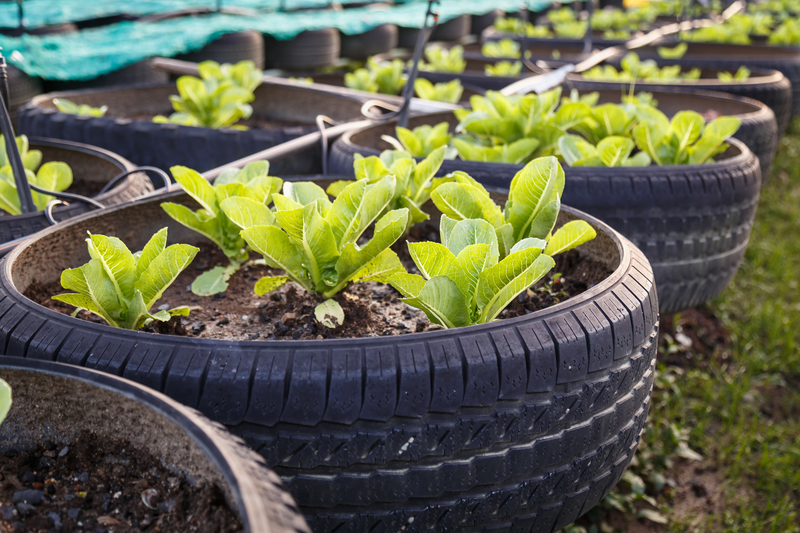Discover 10 Green Waste Hacks for a Cleaner Environment
In today's fast-paced world, generating waste is unavoidable, but reducing and managing it is crucial for ensuring a healthier planet. Implementing green waste hacks can significantly contribute to a cleaner environment. Let's explore ten practical, eco-friendly tips that you can start using today.
1. Composting: Turn Waste into Nutrient-Rich Soil
Composting is one of the most effective ways to reduce green waste. By converting organic waste into compost, you not only reduce landfill burden but also enrich soil naturally.
Benefits of Composting
- Nutrient-rich soil enhancer that boosts plant growth.
- Reduces methane emissions from landfills.
- Decreases the need for chemical fertilizers.
To start composting, gather all your kitchen scraps, garden waste, and paper products in a dedicated bin, and watch your trash transform into treasure.

2. Reusable Bags: Say No to Plastic
Switching to reusable bags is a simple yet effective green waste management strategy. By reducing plastic bag usage, you contribute less to the plastic pollution choking our waterways.
Types of Reusable Bags
- Cloth bags made from cotton or hemp are durable and eco-friendly.
- Tote bags can be used for grocery shopping and daily errands.
- Insulated bags are great for keeping perishables cool.
Get into the habit of carrying reusable bags, and remember to wash them regularly to maintain hygiene.
3. DIY Cleaning Products: Natural and Cost-Effective
Commercial cleaning products often contain harmful chemicals. Opting for DIY natural cleaners not only reduces hazardous waste but is also economical.
Common Ingredients for DIY Cleaners
- White vinegar is excellent for removing stains and odors.
- Baking soda acts as a natural abrasive cleaner.
- Lemon juice provides a fresh scent and has antibacterial properties.
Create your own formulas by combining these ingredients, and enjoy a green cleaning routine.
4. Repurposing: Unleash Your Creativity
Instead of discarding items, consider how they might be repurposed. This sustainable approach allows you to turn waste into useful and beautiful products.
Ideas for Repurposing
- Glass jars as storage containers or decorative pieces.
- Old t-shirts transformed into cleaning rags or tote bags.
- Bottle caps used in DIY crafts or art projects.
By transforming old items, you reduce waste and give them a new lease on life.
5. Electronics Recycling: Proper Disposal
Electronic waste is one of the fastest-growing waste streams. Recycling electronics is crucial to preventing toxic materials from entering the environment.
Steps to Recycle Electronics
- Locate e-waste recycling centers in your vicinity.
- Donate working electronics to charity or education programs.
- Participate in manufacturer take-back schemes.
Recycling ensures the safe disposal and responsible reuse of valuable materials.
6. Zero Waste Shopping: Be a Conscious Consumer
Adopting a zero-waste shopping habit minimizes unnecessary packaging waste. Bring your own containers and buy in bulk where possible.
Steps to Start Zero Waste Shopping
- Purchase refillable products such as detergents and oils.
- Support stores that prioritize eco-friendly packaging.
- Plan your purchases to avoid impulse buying.
Zero waste shopping involves making thoughtful choices that preserve the environment.
7. Worm Farming: Nature's Recyclers
Worm farming, or vermicomposting, is another excellent way to manage organic waste. Worms break down food scraps, producing a nutrient-rich compost.
Setting Up a Worm Farm
- Purchase a worm bin or create your own from recycled materials.
- Add bedding materials such as shredded paper and coconut coir.
- Add worms and feed them fruit and veggie scraps.
Worm farming not only reduces waste but also yields high-quality fertilizer for your garden.
8. Paperless Options: Technology to the Rescue
In today's digital age, reducing paper waste is easier than ever. Utilize technology to achieve a paperless lifestyle.
Effective Paperless Practices
- Opt for e-bills and notifications instead of paper statements.
- Digitize documents using apps and cloud services.
- Use e-readers for books and magazines.
Transitioning to paperless not only saves trees but also reduces clutter.
9. Community Sharing: Beyond Personal Consumption
Embrace community sharing to minimize waste generation. Sharing resources reduces the demand for new products and promotes sustainable living.
Ways to Foster Community Sharing
- Participate in local tool libraries to borrow rather than buy tools.
- Join car-sharing clubs to cut down on vehicle emissions.
- Use community swap events to exchange goods.
By sharing, you extend the life of products and foster a sense of community.

10. Educate and Advocate: Inspire Change
The most impactful change starts with education and advocacy. Share your knowledge of green waste solutions and inspire others to take action.
How to Educate and Advocate
- Host workshops to teach others about sustainable practices.
- Create social media campaigns to spread awareness.
- Collaborate with local organizations to drive community initiatives.
By advocating for a cleaner environment, you become a catalyst for positive change.
Conclusion
These 10 green waste hacks serve as actionable steps towards a sustainable lifestyle. By incorporating these tips into your daily routine, you can significantly contribute to a cleaner and greener planet. Remember, every small action counts in the pursuit of preserving our environment for future generations.